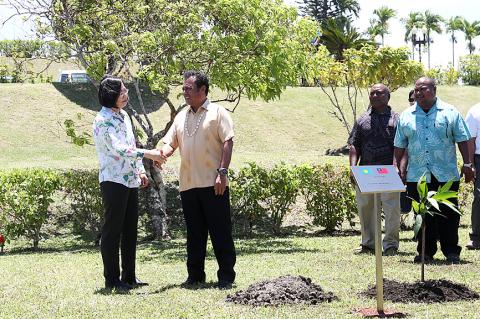President Tsai Ing-wen’s (蔡英文) transit through the US after her visit to three of Taiwan’s Pacific allies is standard practice, the US Department of State said on Thursday.
“President Tsai’s transit through the United States is based on long-standing US practice, and is consistent with the unofficial nature of our relations with Taiwan,” the department said in a statement.
Tsai on Thursday arrived in Palau on the first stop of her eight-day trip to Palau, Nauru and the Marshall Islands, her sixth overseas visit and her second trip to the nation’s Pacific allies since taking office in May 2016.

Photo: CNA
She is scheduled to stay in Palau until today and Nauru from tomorrow to Monday, before arriving in the Marshall Islands on Tuesday for the first-ever Pacific Women Leaders’ Coalition Conference, which is to be held on Tuesday and Wednesday, the Ministry of Foreign Affairs said.
The president is to fly from the Marshall Islands to Hawaii for a stopover on Wednesday, and is scheduled to arrive in Taiwan at 8:20pm on Thursday, the ministry said.
“These transits are undertaken out of consideration for the safety, comfort, convenience and dignity of the traveler,” the department said.
“There has been no change to the US’ ‘one China’ policy, which is based on the Three Joint Communiques and the Taiwan Relations Act,” it said.
The Taiwan Relations Act was enacted in 1979 after Washington severed ties with Taipei, with the aim of defining future unofficial relations between the US and Taiwan.
“President Tsai’s transits will be private and unofficial,” the department said.
American Institute in Taiwan (AIT) Chairman James Moriarty is to greet Tsai when she arrives in Hawaii, it said, emphasizing that the AIT is the institution that carries out Washington’s unofficial ties with Taipei.
The statement reiterated that the US encourages authorities in Taiwan and China to “engage in constructive dialogue that seeks a peaceful resolution of differences acceptable to the people of both sides of the Taiwan Strait.”
In Palau yesterday, Tsai met with Palauan President Tommy Remengesau.
The two participated in a tree-planting ceremony, during which Tsai planted a Jinhuang mango sapling and Remengesau planted an Irwin mango sapling to represent the two nations’ close ties.

US President Donald Trump yesterday announced sweeping "reciprocal tariffs" on US trading partners, including a 32 percent tax on goods from Taiwan that is set to take effect on Wednesday. At a Rose Garden event, Trump declared a 10 percent baseline tax on imports from all countries, with the White House saying it would take effect on Saturday. Countries with larger trade surpluses with the US would face higher duties beginning on Wednesday, including Taiwan (32 percent), China (34 percent), Japan (24 percent), South Korea (25 percent), Vietnam (46 percent) and Thailand (36 percent). Canada and Mexico, the two largest US trading

AIR SUPPORT: The Ministry of National Defense thanked the US for the delivery, adding that it was an indicator of the White House’s commitment to the Taiwan Relations Act Deputy Minister of National Defense Po Horng-huei (柏鴻輝) and Representative to the US Alexander Yui on Friday attended a delivery ceremony for the first of Taiwan’s long-awaited 66 F-16C/D Block 70 jets at a Lockheed Martin Corp factory in Greenville, South Carolina. “We are so proud to be the global home of the F-16 and to support Taiwan’s air defense capabilities,” US Representative William Timmons wrote on X, alongside a photograph of Taiwanese and US officials at the event. The F-16C/D Block 70 jets Taiwan ordered have the same capabilities as aircraft that had been upgraded to F-16Vs. The batch of Lockheed Martin

GRIDLOCK: The National Fire Agency’s Special Search and Rescue team is on standby to travel to the countries to help out with the rescue effort A powerful earthquake rocked Myanmar and neighboring Thailand yesterday, killing at least three people in Bangkok and burying dozens when a high-rise building under construction collapsed. Footage shared on social media from Myanmar’s second-largest city showed widespread destruction, raising fears that many were trapped under the rubble or killed. The magnitude 7.7 earthquake, with an epicenter near Mandalay in Myanmar, struck at midday and was followed by a strong magnitude 6.4 aftershock. The extent of death, injury and destruction — especially in Myanmar, which is embroiled in a civil war and where information is tightly controlled at the best of times —

China's military today said it began joint army, navy and rocket force exercises around Taiwan to "serve as a stern warning and powerful deterrent against Taiwanese independence," calling President William Lai (賴清德) a "parasite." The exercises come after Lai called Beijing a "foreign hostile force" last month. More than 10 Chinese military ships approached close to Taiwan's 24 nautical mile (44.4km) contiguous zone this morning and Taiwan sent its own warships to respond, two senior Taiwanese officials said. Taiwan has not yet detected any live fire by the Chinese military so far, one of the officials said. The drills took place after US Secretary